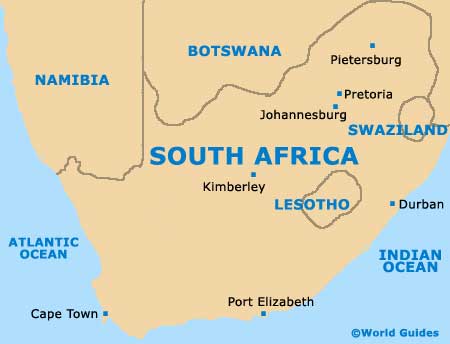This bubbling, simmering story has been sliding along in the news, noted, but usually relegated behind other events. South Africa has the largest economy in Africa, and the 28th-largest in the world. However, about a quarter of the population is unemployed and lives on less than US $1.25 a day.
South Africa, population over 50 million - nearly 80% is indigenous black African
South Africa has a huge economic and political influence on the southern regions of the continent.
Mining is one of South Africa's greatest economic sectors. The country is the world's largest producer of chrome, manganese, platinum, vanadium and vermiculite. It is the second largest producer of ilmenite, palladium, rutile, zirconium, and gold. It is also the world's third largest coal exporter. Over 50% of all gold reserves are found in here. In 2007, gold mining alone employed over 240 000 people and accounted for $US5.5 billion in foreign currency earnings.
Thus, unrest in mining's labor force has huge implications. As of 2007, the South African mining industry employs 493,000 workers. The industry represents approximately 18% of South Africa's US$408 billion GDP. The framework for trouble lies with multinational mining companies, an overwhelmingly black labor force that still lives in the legacy of apartheid-developed mining camps (workers living away from their families, which has left a trail of HIV/AIDS throughout both among workers and at far away homes.
The Lonmin strike of August 2012
The Lonmin mine is just 80 miles or so west of Pretoria and Johannesburg, South Africa, the country's two major cities in which reside the government institutions and centers of economic power.
The Lonmin strike was a strike in August 2012 at a mine owned by a subsidiary of Anglo Platinum, the world's leading platinum producer. A series of violent confrontations occurred between platinum mine workers on strike and the South African Police Service resulting in the death of 36 miners, two police officers, 4 unidentified protestors and 78 more injured.
Starting as some wildcat strikes, numbers swelled quickly - the miners demanding a pay increase and safer working conditions.
Tensions soared, violent confrontations repeatedly occurred.
Both sides were armed in their own fashion.
Controversy emerged after it was discovered that most of the victims were shot in the back. Many victims were shot far from police lines.
Occurring in the post-apartheid era, it was the deadliest incident of violence between police and the civilian population in South Africa since the 1960 Sharpeville Massacre and prompted the South African President, Jacob Zuma to declare a 6 day long week of mourning. On 18 September a mediator announced a resolution to the conflict, stating the striking miners had accepted a 22% pay rise, a one-off payment of 2,000 rand ($US226) and would return to work 20 September.
The latest wrinkle three days ago, October 6, was the announcement that 12,000 miners at the Lonmin mine were being laid off by the company. Where the issue goes is to be seen.
Politics
The political factors in this industrial unrest are serious. The ruling party, the African National Congress, has its roots in representing the majority indigenous black africans of the country, against the international, economic elite - residing mainly among the white population. While much has improved in the past decade in regards to race relations and representative governance, the ANC as the ruling party finds itself walking a tightrope between the aspirations of mine workers and the economic power of mining companies and world economic forces.
Jacob Zuma, President of South Africa
Cynthia Carroll, chief executive of Amplats parent company Anglo American
Mametlwe Sebei - strike/demonstration leader
This is a big world, we happen to have been born into a dominant country, itself part of a prosperous and powerful Western civilization. We're "oversupplied" with news though it may not inform us well. "Six stories from seven continents" is a modest effort to remind ourselves there are snippets, events, and stories from all around the world to hear and learn from... that our awareness is incomplete, and life is breathtakingly more complex and wonderful than we usually imagine.
North Korea

The always bombastic and unpredictable North Koreans go hysterical again. This time the country is prepared to "go to war" with South Korea because that country is playing loudspeakers directed at North Korean territory. A headline from a UK paper reads, "More than 50 North Korea submarines 'leave their bases' as war talks with South continue "
Subscribe to:
Post Comments (Atom)

1 comment:
A BBC article today probes the impact of this strike (here referred to as the Marikana strike in reference to the local area where the mine is situated) on President Zuma and his party, as well as some bewildering court efforts to prosecute miners for their fellow miners' deaths...
http://www.bbc.co.uk/news/world-africa-19466824
Post a Comment